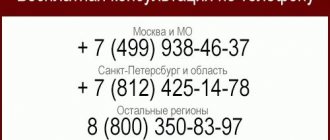The reasons for dismissal according to the Labor Code of the Russian Federation are exhaustive. This means that an employee cannot be dismissed for reasons not expressly provided for in it. At the same time, employers often violate the law and can fire an employee, including because of a trivial conflict with him. Of course, such actions by the employer are neither legal nor acceptable.
And an employee who is faced with such illegal behavior against him must make every effort to defend the rights given to him by the state. In this article we will talk about what reasons for dismissal are legal, as well as in what order dismissal should be carried out on their basis.
Termination of an employment contract at the initiative of the employee.
An employee who decides that he no longer wants to continue working in his job has the right to apply for resignation at any time without giving reasons. The only requirement for him is to comply with a two-week deadline for notifying his supervisor.
Expert advice:
Natalia
Labor expert
Make a resignation letter in writing and hand it to an authorized employee of the employer against signature. If for any reason the employer refuses to accept your application, send it by certified mail, always enclosing a form for notification of delivery of correspondence to the addressee.
The procedure for dismissing an employee at an enterprise at his own request
Article 80 of the Labor Code of the Russian Federation declares certain regulations for the procedure for dismissing an employee who has expressed a personal initiative to terminate the employment relationship. It can be presented step by step as follows:
- Writing a letter of resignation at your own request addressed to the head of the enterprise. Appeals of this type do not have a specific standard; moreover, the basis of personal initiative does not imply a written statement of explanations for the reasons for this.
- Sending the application to the manager for signing and transfer to the HR department. Within 14 days after signing the application, an employee who has expressed a desire to leave the organization must conscientiously perform his official functions. Important! Within a two-week period, the employee may change his mind about resigning and withdraw his application in a separate written request, drawn up in a similar format.
- Preparing a dismissal order and familiarizing the resigning employee with it, making entries in the work book and issuing settlement funds upon dismissal, taking into account wages, vacation pay and other payments due to the employee on the basis of internal documents.
Dismissal at the initiative of the employer.
The dismissal of an employee at the request of the employer is completely different. First, there must be a reason for it. Secondly, such a reason must be indicated in the Labor Code of the Russian Federation as a basis for dismissing an employee. And thirdly, the reason for dismissal must be confirmed by the employer with relevant documents, including acts, memos, explanatory notes, etc.
An employer may demand the dismissal of an employee on one of the following grounds:
- Staff reduction;
- Termination of activities (liquidation);
- Gross failure by the employee to fulfill his obligations, including absenteeism;
- Other grounds expressly provided for by law.
Reasons
There is a strictly defined list of grounds for termination of an employment contract. It is given in Art. 77 Labor Code of the Russian Federation.
Other reasons for dismissal may be established either by the code itself or at the level of federal laws.
For example, additional grounds for dismissal of heads of organizations, civil servants, workers in the transport industry, etc. For most employers, the list from Art. 77 of the Labor Code of the Russian Federation will be exhaustive.
Articles of the Labor Code of the Russian Federation from 78 to 84 reveal and specify the given grounds.
Dismissal without good reason under the Labor Code of the Russian Federation.
Unreasonable or illegal dismissal of an employee at the request of the employer is unacceptable. And if it takes place, the employee can appeal it to the labor inspectorate or the prosecutor's office. As a result of this, the employer faces an unscheduled inspection, an order to eliminate violations, and administrative liability.
Unlawful dismissal can also be appealed in court. A dismissed employee has the right to demand reinstatement at work, payment of wages for the entire period of forced absence from work, as well as compensation for moral damage.
It might be interesting!
What grounds can there be for officially dismissing an employee?
What to do in case of illegal dismissal?
An employee who considers his dismissal to be illegal can appeal it in court. To do this, you need to draw up a claim yourself or with the help of a lawyer, which is filed at the location of the employing company.
The statement describes the circumstances of the dismissal and the justification for its illegality with references to labor legislation.
At the end, a demand is made for reinstatement at work.
If the court finds the employer’s actions illegal, then in addition to restoring the employee to his previous position, he will have to compensate him for forced absenteeism, as well as moral damages.
https://youtu.be/TVn-nc9-qbA
Dismissal during probationary period.
When hiring a new employee, the employer has the right to set a probationary period in order to check his business qualities. The employee also benefits from establishing a trial period, because during this period he can get to know the employer from the inside and understand whether this job is suitable for him.
In general, testing work is almost no different from regular work. Almost all the rights and obligations of the parties to an employment contract are the same. The only difference is the timing and order of dismissal.
An employee who wishes to terminate his employment relationship with the employer during the probationary period must notify him of this in just 3 days, after which he must be dismissed. The same notice period is established for the employer. However, the employer is obliged to substantiate and support his point of view with the evidence available to him. The grounds for dismissal must comply with the Labor Code of the Russian Federation.
In what cases and how can this be done: reasons and procedure
An employer can easily dismiss an unwanted employee, even without his consent, in accordance with such legal grounds (Article 81 of the Labor Code of the Russian Federation) as:
- Inconsistency with the position.
- Failure to perform work duties.
- Violation of discipline.
- Loss of trust.
- Failure of probation.
- Company liquidation and downsizing.
- Changes in working conditions.
When dismissing an employee without his consent, the employer is obliged to correctly carry out such a legal procedure. In this case, he needs to perform the following algorithm of actions:
- Issue an order to dismiss the employee indicating the reason for the cancellation of the employment contract (agreement).
- Give the employee a work book.
- Make final settlement with the dismissed person (based on the settlement note).
- Pay the dismissed person the compensation and payments due to him.
Before making a final decision, the employer is obliged to carefully study the specifics of dismissing an employee without his consent.
Such termination of employment relations must be documented. Otherwise, the employer may be held administratively liable on the basis of Part 1 of Art. 5.27 Code of Administrative Offenses of the Russian Federation.
The following describes when and why an employer has the right to terminate a contract with an employee, whether it is possible to dismiss a person from work under the article, and in what cases management can do this.
Position mismatch
An employer has the right to cancel an employment contract (agreement) with an employee if the latter does not correspond to the position held (clause 3 of Article 81 of the Labor Code of the Russian Federation). This fact is established by the certification commission created in the organization.
The certification commission issues a separate conclusion on the employee’s inadequacy for the position held. However, before making a final decision, commission members must carefully study the reasoned opinion of the organization’s trade union (Article 373 of the Labor Code of the Russian Federation). Moreover, the opinion of the trade union that is not submitted within seven days from the date of the request is not taken into account by the employer.
However, many commercial organizations do not have a union. In this case, the certification commission must coordinate its actions with another representative body of the company created in accordance with Art. 31 Labor Code of the Russian Federation. In the absence of this body, according to the logic of Part 2 of Art. 8 of the Labor Code of the Russian Federation, such a commission is obliged to coordinate its actions only with the head of the organization.
An employer has the right to cancel an employment contract with an employee if the latter is not suitable for the position held, only if such employee cannot be transferred to another vacant position that corresponds to his current state of health and qualifications (Article 81 of the Labor Code of the Russian Federation).
If an employee’s written refusal to transfer is received or if there is no suitable vacancy confirmed by the staffing table, the head of the organization has the right to dismiss such an employee without his consent.
Failure to fulfill duties
A legal basis for the cancellation of an employment contract (agreement) without the employee’s consent may also be the employee’s failure to fulfill relevant job duties without good reason (clause 5 of Article 81 of the Labor Code of the Russian Federation). There are two conditions:
- such failure must be repeated;
- such termination of employment relations is possible only if the appropriate disciplinary sanction has already been applied to the employee, and at the time of dismissal it has not been lifted and has not yet been extinguished (clause 33 of the resolution of the Plenum of the Armed Forces of the Russian Federation No. 2 of March 17, 2004).
Violations of the provisions of the following documents are recognized as failure by an employee to fulfill his official duties (clause 35 of the resolution of the Plenum of the Armed Forces of the Russian Federation No. 2 of March 17, 2004):
- employment contract (agreement);
- internal labor regulations;
- job description;
- orders of the head of the organization;
- technical rules;
- other acts in force at the enterprise (company).
In order to correctly dismiss an employee in the event of failure to fulfill his official duties, the employer must necessarily establish the degree of guilt of the employee and other circumstances.
In this case, the head of the organization needs to conduct a separate internal investigation.
In the event of dismissal of an employee for failure to perform official duties, the employer’s general algorithm of actions looks like this:
- Drawing up an act of notification of the employee’s failure to fulfill official duties.
- Issuance of a written order to conduct an internal investigation.
- Appointment of a commission or individual responsible persons.
- Drawing up a report on the results of the inspection.
- Study of the facts revealed during the investigation. The employer needs to pay attention to the causes and consequences of the disciplinary offense. A valid reason cannot be ignored.
- Request a written explanation. The employer needs to request written explanations from its employee as to why he is not properly performing his job duties. If the employee refuses to provide a written explanation, the employer records the refusal in the act.
- Taking disciplinary action against the employee, taking into account all the circumstances. Such collection must be repeated. In case of the first violation, the employee is not subject to dismissal from work.
The disciplinary sanction is lifted after a year. If a new one has not been imposed on the employee during this time, the considered grounds for dismissal disappear.
At the initiative of the head of the organization, at the request of the immediate superior, the trade union, or at the request of the employee himself, the penalty can be lifted earlier.
Violation of discipline
An employer can fire an employee without his desire and for a one-time gross violation of labor discipline (Clause 6 of Article 81 of the Labor Code of the Russian Federation). The following are considered such offenses:
- Absenteeism is absence from the workplace for at least 4 hours of working time, as well as absence from work without good reason throughout the entire working day (shift), regardless of its duration.
- Disclosure of commercial (official) secrets. This, in particular, includes providing free access to protected information, selling protected information to direct competitors of the company, stealing protected information for personal gain, etc. Moreover, a trade secret must be reliably protected by the provision on trade secrets.
- Appearing at work in a state of drug, alcohol or other intoxication.
- Committing theft or embezzlement of property.
- Forgery of documents.
- Violation of labor protection rules, etc.
Before dismissing an employee on the basis of clause 6 of Art. 81 of the Labor Code of the Russian Federation, the employer is obliged to correctly document such a violation of labor discipline.
As a general rule, first the employee’s immediate supervisor draws up a memo and requests an explanatory note from the guilty person.
If there are no valid reasons for committing a disciplinary offense specified in paragraph 6 of Art. 81 of the Labor Code of the Russian Federation (for example, absence from work due to temporary disability), then a corresponding order is issued to dismiss the employee.
Depending on the type of violation of labor discipline, the employer must have on hand the following documents confirming the employee’s guilt:
- If absenteeism is detected , a written request for an explanation of the reasons for absenteeism (in 2 copies). If the employee refuses to sign such a document, a separate mark of refusal is affixed. If within 2 days the employee has not provided written explanations for the violation of labor discipline, a report about this is drawn up. Read about how many days of absenteeism you can dismiss an employee under the article here.
- If an employee fails to show up for work , a documentary recording of this fact in the time sheet, a memorandum drawn up by the immediate supervisor of the guilty employee, and an act.
- When appearing at work in a state of intoxication - a medical report or a report with the results of the employee's breathalyzer test. Moreover, such a test must be carried out in the presence of at least 2 witnesses. Read about how to deal with a drunk employee and a drug addict here.
- In case of theft of the organization's property or falsification of the documents provided - a court verdict (decision), a resolution of an administrative body. The employer does not have the right to independently establish facts of theft of property or forgery of documents.
- If a trade secret is disclosed - an internal memo from the security service or other officials who revealed this fact, or a decision of a commission created by the head of the organization to conduct an internal audit.
- In case of violation of labor protection requirements - the conclusion of the labor protection commission created in compliance with the requirements of Art. 218 Labor Code of the Russian Federation.
When choosing a disciplinary measure under clause 6 of Art. 81 of the Labor Code of the Russian Federation, the employer should take into account the principle of proportionality of punishment to the offense.
That is, if there are appropriate circumstances that mitigate the employee’s guilt, or his guilty actions were committed under the influence of external factors (for example, extreme cold or, conversely, high heat in the work area, which often leads to a violation of safety regulations), then the head of the organization has the right to refuse from dismissal of such a person. In this case, a reprimand is issued or a reprimand is issued (Article 192 of the Labor Code of the Russian Federation).
The grounds for disciplinary action in the form of dismissal and the procedure can be found here.
Loss of trust
The head of a company (enterprise) has the right to dismiss an employee without his consent and due to loss of trust (Clause 7, Article 81 of the Labor Code of the Russian Federation). However, according to paragraph 45 of the resolution of the Plenum of the Armed Forces of the Russian Federation No. 2 of March 17, 2004, for this reason, the head of a company (enterprise) can cancel an employment contract only with employees servicing the organization’s inventory:
- cashiers;
- storekeepers;
- delivery drivers;
- accountants-cashiers;
- sellers;
- warehouse managers, etc.
You can dismiss an employee due to loss of trust on the following legal grounds:
- fictitious write-off of inventory items;
- fraud;
- violation of cash discipline;
- destruction, loss or theft of the organization’s property;
- weighing, counting;
- overstatement (understatement) of prices for goods;
- shortage, etc.
The fact of committing one of the illegal actions must be documented.
The head of the organization is obliged to collect the necessary evidence of the employee’s guilt (for example, conduct an internal investigation).
A special commission is formed to conduct an internal investigation in the organization. The basis for such an event is a report or official note drawn up by the immediate superior of the guilty employee.
During an internal investigation, the head of the organization must request a written explanation from the employee. The employee must submit such a document to his employer within 2 working days (Article 193 of the Labor Code of the Russian Federation). If an employee refuses to give written explanations, this must be recorded in the act.
The results of the internal investigation are indicated in the relevant act. The proposal also includes the commission's proposal on the punishment for the guilty person. The act is signed by the chairman of the commission and its members.
Failure on probation
It is possible to dismiss an employee without his consent on the basis of Art. 71 of the Labor Code of the Russian Federation, that is, if the employee fails to complete the probationary period.
This is possible if the test result is unsatisfactory (incompetence of the new employee, violation of discipline, complaints from the security service, etc.).
In case of failure during the probationary period, the employer sends the employee a written warning about his failure to complete the probationary period, which entails the cancellation of the employment contract (agreement). A written notice of dismissal must be sent to the employee no later than 3 days before the date of termination of the employment contract.
A dismissed employee has the right to appeal his dismissal during the probationary period. To dismiss an employee on the basis of Art. 71 of the Labor Code of the Russian Federation, the head of the company (enterprise) must have in hand appropriate written evidence of the unsatisfactory result of the employee’s test (memorandums, customer reviews, written explanations, etc.).
Company liquidation and downsizing
The employer has the right to dismiss an employee without his consent in the event of liquidation of the company or reduction of staff. Moreover, in the second case, the head of the organization must prove that such an employee does not have a preferential right to occupy the current position (for example, due to low qualifications in accordance with Article 179 of the Labor Code of the Russian Federation).
If the position itself is reduced (for example, the company no longer needs a driver), then the preemptive right is not taken into account - the company no longer has a position in which the employee could be left.
Judicial practice clearly confirms this (see the appeal ruling of the Supreme Court of the Republic of Bashkortostan No. 33–18392/2014, 33–375/2015 of January 20, 2020, the appeal ruling of the Moscow City Court No. 33–978/2015 of January 16, 2020).
The employer is obliged to notify the dismissed person about liquidation or reduction 2 months before such events are carried out (Part 2 of Article 180 of the Labor Code of the Russian Federation). In this case, the employee is sent a written notice against signature and mail at his place of residence, if the employer is notified of the postal address.
A written notice of dismissal is issued in 2 copies. One of them is transferred to the dismissed employee, and the second remains with the employer.
If an employee refuses to sign a written notice, the employer must draw up a separate statement about this. In this case, the countdown of the two-month period begins from the day following the day of execution of such an act.
After 2 months after delivery of written notice of liquidation of the organization (reduction of staff), the employer issues an order to dismiss the employee.
After the employee familiarizes himself with such a document, an entry is made in his work book against signature on the cancellation of the employment contract (agreement) on the basis of clause 1, part 1, art. 81 Labor Code of the Russian Federation.
Changes in working conditions
It is possible to dismiss an employee without his consent if organizational or technological working conditions change (Article 74 of the Labor Code of the Russian Federation). In this case, the employer sends the dismissed employee a written notice of changes in working conditions included in the relevant employment contract. Moreover, this must be done no later than 2 months before the occurrence of such an event.
If the employee does not agree to work under the new conditions, the employer is obliged to offer him in writing another vacant position or job that corresponds to the employee’s state of health and qualifications. If they are absent or the employee refuses the offered work, the employment contract (agreement) is canceled in accordance with clause 7, part 1, art. 77 Labor Code of the Russian Federation.
Dismissal due to death of the Labor Code of the Russian Federation.
Natalia
Labor expert
One of the grounds for terminating an employment relationship with an employee is his death. The employer issues an order to terminate the employment relationship with a deceased employee on the basis of a death certificate. The day of termination of the employment relationship is the day of the employee’s death.
The employer is also obliged to enter information into the work book of the deceased employee about the termination of the contract with him in connection with death, and give it to one of the employee’s relatives, or, upon his written application, send it by mail.
Attention! It is prohibited by law to send work books outside the Russian Federation. Therefore, if a relative of the deceased asks to send his work book abroad, the employer should send him a letter containing information about this provision of the law, as well as with a request to appear for the work book in person, or indicate a sending address located within Russia.
Is training necessary?
Work off is one of the prerequisites for dismissing an employee. A period of time of two weeks is used to find a replacement for the dismissed specialist. However, there is a separate category of workers who receive the right to quit without working off. This category includes pregnant women and people retiring.
In addition, there is an accelerated form of the dismissal procedure. In this case, the period of mandatory work is only three working days. This procedure is used when dismissing workers who have not completed the probationary period or those workers who are involved in seasonal work.
How to properly dismiss an employee for health reasons under the Labor Code of the Russian Federation.
If the employee’s health condition has deteriorated and does not allow him to continue to perform his job function, the employer is obliged to offer him another job that he will be able to perform. But if he does not have such work, or the employee himself expresses his refusal to transfer, the employer will have to terminate the employment relationship with him. The dismissal of such an employee must be properly formalized.
So, if an employee refuses another position offered to him, his refusal must be made in writing. And if the employer does not have such a position, then he must draw up a corresponding written notification. After this, the employer must draw up a dismissal order for medical reasons.
The wording of the entry in the work book will also differ depending on what exactly caused the dismissal - the employee’s refusal to transfer, or the employer’s lack of suitable work.
It might be interesting!
What to do if your employer fires you without warning
On the last day of work, such an employee must be given a paycheck, which must include:
- Remaining salary;
- Compensation for unused vacation days;
- Severance pay in the amount of two weeks' average earnings.
Registration procedure
When registering a dismissal, a certain procedure must be followed. Otherwise, the dismissal will be easy to challenge and be declared illegal.
The main stages of the dismissal procedure will be:
- warning of impending dismissal;
- termination of the employment contract;
- issuance of an order;
- making an entry in the work book;
- issuance of calculations and documents.
Submitting an application
If an employee wishes to resign, he notifies the head of the employing company in advance.
The application is submitted two weeks before the date of the proposed dismissal (Article 80 of the Labor Code of the Russian Federation).
If the case occurs during the probationary period, the warning period is reduced to three days.
There is no single application form, but it must reflect the reason for termination of the employment relationship - your own desire.
A sample letter of resignation at your own request is here.
Before the date specified in the application, the employee may change his mind about resigning and withdraw the document. But this is only possible until a new employee is invited in writing to fill the vacant position.
If on the last day the dismissal order was not issued and the employee does not insist on it, the employment relationship continues.
The dismissal of an employee sentenced to imprisonment is carried out in the manner prescribed by law.
What is the period of service upon dismissal? See here.
Order
The fact of termination of an employment contract, regardless of the reason, is formalized by order.
As with all basic personnel documents, there is a unified T-8 form for it. You just need to fill in the appropriate fields.
It is necessary to familiarize the employee with the order, and against signature. If you refuse to do this, for example, when you are dismissed for a disciplinary offense, an entry is made directly on the document. A copy of the order, certified by a seal, can be issued simultaneously with the work book.
A sample order for the dismissal of an employee at his own request is here.
Entry in the work book
The work book still remains the main document confirming the length of service of each employee.
On the last working day, the employer issues a work book, which must contain records of hiring, all transfers and dismissal.
The last entry contains the date of dismissal and its reason, formulated exactly as in the Labor Code and with reference to the relevant article.
The basis for making an entry is an order, the number and date of which are indicated in the corresponding column. The dismissal record is certified by the signatures of the employee himself and the HR employee, as well as the seal of the organization.
How to dismiss an external part-time worker at the initiative of the employer, Article 288 of the Labor Code of the Russian Federation?
Employment relations with a part-time worker are terminated on the same basis as with main employees. At the same time, Art. 288 of the Labor Code of the Russian Federation establishes one additional basis for their dismissal at the request of the employer. This applies only to those part-time workers who perform their labor function under an open-ended contract.
The employer has the right to terminate the employment relationship with them if they hire an employee for whom it will be the main one. The employer is obliged to notify the part-time employee of his decision in writing. Such notice must be given to him no less than 14 days before the date of his dismissal.
Timing of voluntary dismissal
The duration of the procedure depends on the grounds for dismissal at the initiative of the employee. The total period from the date of application is 2 weeks plus 1 day for self-dismissal.
If an employee goes on vacation and then leaves the organization, then the period will be extended by the amount of the vacation, but all documents will be completed before the employee leaves for it.
If the employee belongs to the category of people who must be said goodbye immediately, then the dismissal occurs in one day.
Special mention should be made of conscript workers; the Labor Code of the Russian Federation allows them to submit an application three days before dismissal.
Is it possible to fire an employee at will?
Do you want to know how to fire an employee at will? Easily! Its essence is as follows: the employee writes a letter of resignation, the head of the online store signs it. The document is written addressed to the manager something like this: “I ask you to voluntarily dismiss me from the position of sales manager on such and such a date.” Date, signature.
Everything happens by mutual agreement of the parties, all that remains is to comply with the formalities:
- issue a dismissal order. The document must indicate the reason for dismissal and the date of termination of the employment contract;
- make an entry in the work book indicating the order number;
- pay the employee all the money - salary, vacation compensation, bonuses, and so on;
- hand over a work book;
- notify the funds of termination of the employment contract in order not to pay contributions.
An important point. You have the right not to release the employee immediately, but to assign him work. That is, the employee does not leave on the same day when he wrote the application, but works for some more time. The maximum period is 2 weeks from the date of filing the resignation letter. This period is given to find a new employee to replace the old one. In this case, on the application you need to write something like this: “I don’t mind working for two weeks.”
Don't forget to give the employee a worksheet - a "slider". The employee must hand over everything that you gave him for work: phone, laptop, and so on. Passed it - received a signature in the slider. If you don’t pass, you won’t see any compensation or signature on the application.
And the video below explains how to fire an employee in 1C.
https://youtu.be/QYdVooO0Yoo
Which employees are fired due to staff reductions?
Is it possible to fire an employee due to redundancy? Yes. But this is the worst option for you. Why? Yes, because in this case the employee will have to pay monetary compensation. Its maximum amount is 3 monthly salaries. In addition, compelling reasons are needed to downsize:
- change in work model. Let's say an employee performed some functions. You've streamlined the process so that a computer program now does it. The need for a person has disappeared, and it needs to be reduced;
- drop in work volumes. The number of orders has dropped, and now 2 managers can easily handle the task instead of three. One is being laid off;
- restructuring. You are closing a branch in the city of N., all office employees in this city are no longer needed, they need to be fired.
The employee is notified of dismissal due to reduction at least two months in advance. This is done in the format of a notification, with which the employee is informed against signature. From this moment on, a person has the right to one paid day off per week to look for a new job. Which is again unprofitable: there is no employee at the workplace, but you need to pay money.
Not everyone can be laid off. Pregnant women, people under 18 years of age, the only breadwinners in the family, people with disabled children and a number of other employees cannot be fired due to staff reduction. And now, according to the new law adopted by the government and approved by the president, it will be impossible to lay off people before retirement age. These are those who have five years or less left before they retire.
One more thing. Remember, you are not laying off Ivan Ivanovich Ivanov, but a position, for example, a sales manager, that is, a staff position. There were 10 managers, after the reduction there were 9. And it’s up to you to decide which of the 10 people to fire.
How to properly fire an employee for violating labor discipline
And here we will answer the question: how to fire an employee without his desire and how to fire an employee for absenteeism. Let's say right away that this is not the easiest way to get rid of a careless employee. And that's why. Any violations must be properly proven. You cannot fire a person with this wording in one go. Now the former employee will run to “competent” lawyers who can prove in court that the person was kicked out unjustly. They say that the manager had a personal dislike for him, took advantage of him, and so fired him for simple tardiness. And others are late, and nothing happens.
To prevent this from happening, you will need a multi-step approach. For example, an employee is constantly late and disrupts the work process. Start small - reprimand him. Being late a second time means a severe reprimand. For the third delay - dismissal. The most important thing is to get it all in writing. You cannot prove an oral reprimand in court. Therefore, the reprimand is only written, with the signature of the “accused” and his explanatory note.
You also need to draw up a violation report in free form. The wording is something like this: “So-and-so on such-and-such a date was 40 minutes late for work, which put the work process in jeopardy.” The act must be signed by the offender and at least three witnesses - they can be taken from among other employees.
The second delay is formalized in exactly the same way, only we use a severe reprimand as a punishment. We also attach to it an act of violation with the signature of the violator and witnesses, as well as an explanatory note from the latecomer. Now you have something to show in court.
Please note that being late is considered a person's absence from work for 15 minutes or more. If an employee is delayed by three to five minutes, nothing can be done about it. By the way, absenteeism is absence from place for 4 hours in a row.
Now watch. People are rarely fired for violating labor discipline. Why spoil a person’s work record so that he then can’t get a job anywhere? This is not usually done. Invite the offender to your place and present him with a fact: either you write a statement of your own free will, or we will fire you under the article. We assure you that everyone will choose option No. 1 first, and you will part relatively peacefully. They won't even ask for detention.
How to legally fire an employee for inconsistency
How to dismiss an employee legally for inconsistency? This is similar to the previous case, only instead of violations of discipline there will be mistakes in work. Here everything is much more complicated - you can’t get off with a simple act. Serious evidence is needed. Now we will tell you which ones. Let’s make a reservation right away: this is how they work at manufacturing enterprises. In online trading, none of this is observed, although it should be. So, to fire an employee for incompetence, you need to:
- develop and approve several instructions for the employee. For example, a job description, instructions for working with a personal computer, safety instructions;
- Conduct a knowledge test of job descriptions every year. With the preparation of protocols and journal entries;
- conduct employee training.
If you don’t do all this (and you don’t), then it’s impossible to fire a person for incompetence. Evidence of performance inadequacy is when an employee fails to pass an examination of his knowledge of his instructions. No instructions and exams - no dismissal. Dot.
How to properly dismiss an employee upon expiration of an employment contract
It's relatively simple here. There is a contract that has an expiration date. A year, three, five - it doesn’t matter. One of the last clauses of such an agreement usually states that upon expiration, it can be extended by agreement of the parties. Or maybe it won't be extended. Then the employee leaves your company without any consequences.
Calculation of a dismissed employee for health reasons
They mainly refer to employees of online stores specializing in the delivery of food and groceries. They have a kitchen, whose employees are required to have medical records and undergo annual medical examinations, taking a bunch of tests.
It must be said that the medical examinations are strict, and the doctors are picky. Therefore, sometimes it happens that an employee does not pass the test for some reason. And no matter how sorry it is, you will have to part with such a person.
The same thing, for example, with courier drivers. All of them undergo periodic medical examinations to obtain and renew a driver’s license, pass a technical inspection, and so on. If at some point the coveted certificate cannot be obtained, the person is deprived of the right to drive vehicles and cannot continue to work. He will also have to be fired.
Below, see the video that explains how to fire an employee under the 2020 law.
https://youtu.be/9rHaEgI1wnU
Technically, everything is done very simply. There is a reason for dismissal - health status. This is confirmed by the corresponding conclusion of the medical institution. All you have to do is issue a dismissal order and attach this certificate to it. The wording of the order and the entry in the work book will be “Dismissed for health reasons.”
In this case, we are not talking about any kind of work - the person quits, as they say, in one day. True, you can offer the person being fired another position in your organization.










